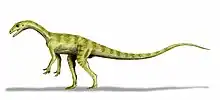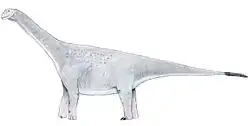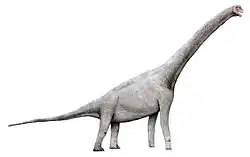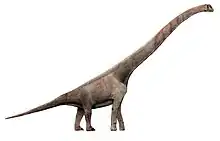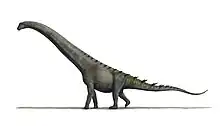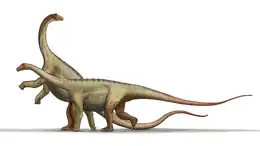Tienshanosaurus
Tienshanosaurus (meaning "Tienshan lizard") is an extinct genus of dinosaur from the Late Jurassic. It was a sauropod which lived in what is now China. Only one species is known, Tienshanosaurus chitaiensis, which was named and described in 1937.[1]
| Tienshanosaurus Temporal range: Late Jurassic, | |
|---|---|
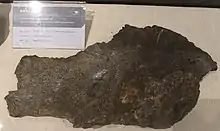 | |
| Holotype scapula, Paleozoological Museum of China | |
| Scientific classification | |
| Domain: | Eukaryota |
| Kingdom: | Animalia |
| Phylum: | Chordata |
| Clade: | Dinosauria |
| Clade: | Saurischia |
| Clade: | †Sauropodomorpha |
| Clade: | †Sauropoda |
| Family: | †Mamenchisauridae |
| Genus: | †Tienshanosaurus Yang, 1937 |
| Species: | †T. chitaiensis |
| Binomial name | |
| †Tienshanosaurus chitaiensis Yang, 1937 | |
Discovery and classification
On 11 September 1928 Chinese geology professor Yuan Fu ("P.L. Yüan") discovered in Xinjiang the remains of about thirty adult and three juvenile sauropods, which he uncovered during the following weeks. The finds, including a fossilized egg, were sent to Beijing where they ultimately became part of the collection of the Institute of Vertebrate Paleontology and Paleoanthropology. In 1937 paleontologist Yang Zhongjian ("C.C. Young") named the type species Tienshanosaurus chitaiensis.[1] The generic name, suggested by Yuan, refers to the Tian Shan, the "heavenly mountains". The specific name refers to the location Chitai or Qitai.
The holotype, IVPP AS 40002-3, was found near Paikushan, Luanshantze, in sandstone of the Shishugou Formation dating from the Oxfordian. It consists of elements of the postcrania. A considerable part of the skeleton is known but not the skull or the lower jaws. The body length has been estimated at twelve metres.
In 1991 Ralph Molnar renamed Euhelopus zdanskyi to Tienshanosaurus zdanskyi,[2] despite the species having priority over T. chitaiensis, made possible by the fact that Euhelopus is a renaming of the earlier Helopus. Meanwhile, Valérie Martin-Rolland renamed T. chitaiensis into Euhelopus chitaiensis.[3]
Due to the fragmentary nature of the material and a limited description, it has not been easy to establish the affinities of Tienshanosaurus. Originally classified in the Helopodinae, it has been assigned to many groups, among them the Astrodontidae, Euhelopodidae, Brachiosauridae, and Camarasauridae, but recent consensus (2011) has been to assign Tienshanosaurus to Mamenchisauridae.[4]
References
- C.-C. Young, 1937, "A new dinosaurian from Sinkiang", Palaeontologia Sinica, New Series C, Whole Series No. 132 213: 1-29
- Molnar, R. E., 1991, "Fossil Reptiles in Australia", In: Editors P. Vickers-Rich, J. M. Monaghan, R. F. Baird and T. H. Rich with the assistance of E. M. Thompson and C. Williams, Vertebrate Palaeontology of Australasia. Pioneer Design Studio for and in co-operation with Monash University Publications Committee, p. 605-702
- V. Martin-Rolland, 1999. "Les sauropodes chinois", Revue Paléobiologie, Genève 18(1): 287-315
- T. Sekiya. 2011. Re-examination of Chuanjiesaurus anaensis (Dinosauria: Sauropoda) from the Middle Jurassic Chuanjie Formation, Lufeng County, Yunnan Province, southwest China. Memoir of the Fukui Prefectural Dinosaur Museum 10:1-54.
